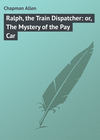Читать книгу: «Bound to Succeed: or, Mail Order Frank's Chances», страница 5
CHAPTER XI
A FRIEND IN NEED
“Hands off!” cried Frank.
His assailant laughed coarsely. He had Frank firmly in his grasp. Pushing him against the steps of one of the coaches, still gripping his two wrists in one hand he bent him back flat.
No one was in sight down the long, poorly-illuminated passenger platform. Frank at once guessed that the fellow had seen him counting over his money in the waiting room and had followed him to this spot.
Frank twisted his lower limbs to one side. His assailant was trying with his free hand to reach the pocket in which he had seen Frank place his little cash capital. Frank’s movement disconcerted the would-be thief. He grew angry as his captive wriggled onto one side, holding his pocket pinned up against the car step.
“Hi, you, turn over,” growled the fellow.
He gave Frank a jerk and then slapped him hard against the side of the head. He managed to thrust his hand into his pocket containing the money.
“Ouch!” he yelled, just as his eager fingers touched the roll of bank notes. “Zounds! who did that?”
Whack – Frank caught this sound, preceded by the air-cutting whistle of some swiftly-directed object.
Whack – whack! the sound was repeated. Frank was free. His assailant had relaxed his grasp. His hands were now busy warding off mysterious blows in the face.
Frank darted to one side, his precious savings clasped by one hand. He stared in wonder.
Some one on the roof of the front passenger coach was leaning over its rounding edge. He was armed with a jointed piece of iron. This he plied whip-fashion. Twice its end had struck the robber’s face, leaving two great red welts.
Then a spry, nimble form dropped from the car roof to the platform. Frank made out a boy about his own age. He was dressed wretchedly, and was thin and weak-looking, and his face was grimed, but he must have had pluck, for, running straight up to the would-be thief, he plied the weapon in his grasp like a flail.
A sharp blow made the ruffian roar with pain. Holding a hand to his eye, he retreated down the platform, fairly beaten off.
“There’s a police officer,” said Frank suddenly, noticing a man wearing a uniform come running down the platform from the direction of the waiting room.
“Oh, pshaw!” ejaculated his rescuer, springing nimbly to the platform of the nearest coach.
“Hold on, hold on,” cried Frank – “I want to thank you, I – ”
But his mysterious friend had sprung across the car platform in a jiffy. He was swallowed up in the darkness beyond.
“What’s up?” hailed the policeman, running up breathlessly.
“A man tried to rob me,” explained Frank.
“Thought I made out a struggle. Did he get anything?”
“No.”
“Where did he go?”
Frank pointed towards the fan-shaped network of tracks melting into the gloom of the switchyards.
The policeman ran in that direction. Frank did not accompany him. He did not believe the officer would catch the thief. Besides, Frank was more interested in the strange young fellow who had done him such good service in his time of need.
Frank stepped up on the coach platform and peered up and down the sidings near by. His rescuer was nowhere in sight. Frank was sorry for this. The boy had struck him as a hard-luck object. His manifest reluctance against being seen by the officer suggested something sinister about him.
Frank stood waiting for the return of the policeman, a vivid picture of his rescuer in his mind. The boy had worn a cap pulled far down over his eyes. He seemed young, yet Frank recalled that he wore a moustache.
“I’d like to give him something for saving me the loss of all that money,” said Frank. “The poor fellow looked as if he needed it. Any trace of the man, sir?”
“No,” answered the policeman, coming back from a fruitless search. “Better keep nearer the lights, young fellow. All kinds of rough characters hang around here, on the lookout for somebody to rob.”
Frank walked with the policeman to the depot rotunda. He stayed outside, however. Once or twice he walked the whole breadth of the rotunda, peering down the passenger tracks and wishing he could find the boy who had beaten off the thief.
“There is some one now,” suddenly exclaimed Frank to himself.
He made a dash down a lonely platform and ran across a couple of tracks.
“Yes, it’s him,” declared Frank. “Hey, just a minute. Why, what are you running away from me for?”
The person Frank was after had started up quickly at the first hail. Frank overtook him, cornering him where some milk cars blocked the way south.
The strange boy braced back against the side of a car, pulled his cap down further over his eyes, and said.
“Want me?”
“Sure, I want you,” cried Frank spiritedly. “First, to shake hands with you and thank you for your bravery in my behalf.”
“Oh, that wasn’t anything,” observed the strange boy.
“No, only the saving of all the money I’ve got in the world,” retorted Frank.
He shook the boy’s hand warmly. The latter at last slightly returned the hand pressure, but kept looking about him furtively and uneasily.
“By the way,” said Frank, “what was that you hit that man with?”
“A loose-jointed ventilator slide bar I found on top of the coach.”
“And, if I may ask, what was you ever doing perched up there?”
“Well, if you must know, I was waiting for the train to start out. In fact,” confessed the speaker in a low, constrained tone, “beating my way, stealing a ride.”
“Where to?” asked Frank.
“Oh – anywhere, anywhere away from the city.”
The boy said this in such a forlorn way that Frank felt there was some pathetic cause for the despair expressed.
“You ran away from the policeman, too,” suggested Frank.
“Yes, he wouldn’t have much use for my kind,” observed the boy.
Frank was silent for a moment, intensely studying as far as the dim light would allow the figure and face of his companion.
“What’s your name?” he asked suddenly.
“My name – oh,” sort of stammered the boy, “why, it’s Markham.”
“Well, Markham,” said Frank very kindly, placing a gentle hand on the lad’s arm, “you and I should be good friends. Don’t edge away from me. You say you were trying to get out of the city. Had you no idea of where you were bound for?”
“Nowhere, but the country. Some place where I’d be safe – I mean where they couldn’t find – that is, oh, just to get to some quiet little country town where I could get work.”
“I’ve got the town and I’ll guarantee the work,” cried Frank heartily, slapping Markham on the shoulder. “See here, no secrets between friends now. You’ve got no money, or you wouldn’t be riding on car tops.”
“That’s true enough,” admitted the boy, forcing a laugh.
“And maybe you’re hungry.”
There was no reply to this, but Markham’s eager eyes strayed in the direction of the lighted waiting room and its gleaming coffee tank and polished lunch counter.
“Come on,” urged Frank, keeping up a cheery, good-fellow air. “I’m ready for a bite, too.”
Markham held back as Frank tried to pull him along with him.
“See here – ”
“Newton – Frank Newton, that’s me.”
“Well, I can’t go with you. In the first place, I’m a sight for respectable people. In the next place,” went on Markham, “there’s some people I don’t want to risk meeting.”
Frank reflected for a moment or two.
“Will you stay here for five minutes till I come back?” he asked.
“Why, yes, if you want me to,” was the reply.
“All right. Be sure, now.”
Frank was gone less than the five minutes. He returned with a little tin pail holding a pint of hot coffee, a picnic plate containing two sandwiches, a piece of pie and some doughnuts.
“There, try that,” he said, placing the things on a bumper post.
“Say,” choked up Markham – but Frank strode away, whistling to himself. He did not approach Markham until every vestige of the lunch had disappeared.
“That’s the first square meal I’ve had for two days,” said Markham in a grateful, contented tone. “Say, you’re good.”
“Am I?” smiled Frank. “I’m good for your railroad fare to where I live, and a job right on top of it for you, if you say so.”
“Do you honestly mean that?” asked Markham, almost solemnly, his voice quite tremulous.
“Every word of it,” declared Frank. “I live at Greenville. It’s about a hundred and fifty miles down state. Say the word, Markham. I can see you’re in trouble or distress of some kind. I’m not prying to find out what it is. I only want to show what I think of you for saving my money, and maybe my life with a courage that has got to belong to a first-class fellow.”
Markham bowed his head as if in deep thought. Frank saw a tear fall to the platform. Finally his companion spoke again.
“If you will advance my fare,” he said, “I’ll pay you back first money I earn.”
“That’s a bargain,” said Frank. “Come on. We’ll buy your ticket right now.”
“No,” demurred Markham, holding back in a timorous way. “You get both tickets. I’ll be somewhere on the train. I’d rather sort of hang around the smoker and the platforms till we get beyond the city limits.”
“All right,” said Frank.
He had a vague idea in his mind that Markham was afraid to show himself publicly in the city, for some reason or other. Frank even speculated as to the possibility of Markham being disguised. He looked, acted and talked like a boy about his own age. The moustache, however, suggested that he was a young man of about twenty.
Frank made his new acquaintance promise positively he would be on the train. He went back to the depot and bought another ticket to Greenville. He was somewhat anxious and impatient until the train started up.
There was a first stop at the limits of the city. Just as the train steamed ahead again, some one entered at the rear door of the coach.
“Hello – good,” exclaimed Frank, as Markham quietly sat down in the seat beside him. “Why – ”
Frank paused there, staring at his fellow-passenger. Markham had washed the grime from his face. He no longer wore the cap pulled down over his eyes. Looking bright as a dollar, he smiled, pleasantly.
“Pretty grimy, wasn’t I?” he laughed.
“Why, yes,” stammered the puzzled Frank, “but say – what has become of your moustache?”
CHAPTER XII
A BOY WITH A MYSTERY
The boy who called himself Markham flushed scarlet at Frank’s sudden words. His hand went with a quick, nervous movement to his upper lip. He looked dreadfully embarrassed.
“Never mind,” said Frank abruptly, trying to make it easy for the young fellow. “You look better without it.”
Markham had gained time now to cover his confusion. He swallowed a lump in his throat and smiled feebly.
“You see,” he stammered somewhat, “that wasn’t a real moustache – that one I’ve dropped.”
“Oh, wasn’t it?” said Frank.
“No. How I happened to have it was this,” explained Markham, rather lamely, but with apparent truth. “See?” and he produced from a pocket two false moustaches and as many small goatees. “Fact is, I wanted to earn some money. I saw a peddler selling those things on a street corner. They went like hot cakes. I asked him where he bought them. He told me, said he had taken them up only temporarily to make a little pocket money. He was nearly sold out, and offered me about a dozen of them for a quarter. I sold nearly all of them, and then went to the address he gave me to stock up again. They wouldn’t sell under a gross – three dollars and sixty cents, I think the price was. I didn’t have that much, so my scheme fell down.”
Markham now took a printed circular from his pocket, as if to verify his statement. Frank glanced over it with increasing interest. It advertised a city firm supplying street peddlers with all kinds of goods.
“Yes,” said Frank, “I noticed a man selling these same articles on a street corner. It’s a pretty catchy novelty with boys and young men.”
“It is, for a fact,” declared Markham. “Look here: did you ever see ‘Teddy’s Teeth?’ That’s an old novelty – look.”
Markham produced and put in his mouth a row of false teeth, welted the reverse side of a moustache, placed it on his upper lip, a minute black dab of hair on his chin, and turned for inspection to Frank.
The latter laughed heartily. The transformation from Markham’s natural face was immense.
“You have no idea how those things catch people the first time they see them,” said Markham. “I’ve noticed that fellows from the country buy best. Say, if I had a gross of them, I bet I could sell them in two days, down your way.”
“I think you could, too, Markham,” replied Frank, “and you have set me thinking on an entirely new business proposition. Can I keep this circular?”
“Surely, if it’s any use to you.”
“It may be,” said Frank, “in fact, I think I shall order a gross as soon as I get home, just to experiment on.”
“Going peddling?” insinuated Markham.
“Why, I’ll tell you,” answered Frank. “Settle down comfortably, and we’ll chat a little. It will do me good to talk out what’s continually on my mind. More than that, I shouldn’t wonder if you, with all your experience, could give me some very valuable points. The long and short of it is, I am going into the mail order business.”
“Oh!” said his companion wistfully, “isn’t that grand.”
Frank told his new friend all about himself, his business and his hopes and plans. The other listened with great attention. When Frank had finished talking, Markham showed by his expression of face that he considered him a pretty smart business boy.
“If you can afford to hang around with me till I get my bearings,” added Frank, “I’ll guarantee you a comfortable home anyway, and good money if you know how to earn it.”
Markham’s eyes grew big with excitement. Then his face fell, as he said:
“I’d like nothing better in the world, but business men don’t hire strangers without a recommendation. I can give none. I’ll be square with you. My name isn’t Markham at all. I can’t tell you my real one until maybe a long, long time. I wore that moustache partly as a disguise.”
“Well, all that is your business, Markham,” said Frank.
“I know that, but it must look suspicious to you. If I told you that I am leaving the city to get away from some one who is hunting me, would you feel like trusting me much?”
Frank took his companion’s hand in his own and looked him straight in the eyes.
“Markham,” he said, “I am willing to put entire confidence in you. I owe you that much, surely. Your secrets are not my business, I would like to ask one question only: You haven’t run away from home, have you?”
“I have no home,” answered Markham in a subdued tone.
“An orphan?” insinuated Frank, gently.
“No, my father is living. He is in the Philippines. He will be out of service next January. All I am waiting for is for him to get back to this country to right my wrongs.”
“Don’t worry about it, Markham,” said Frank, observing deep sadness and distress shadow the bright face of his companion. “You come home with me. I’ve got so good a mother she will welcome you gladly.”
“But I want to work,” said Markham.
“Haven’t I got work waiting ready for you, and lots of it, too?” demanded Frank.
“That’s so, is it?” said Markham, brightening up. “My! to be away – away from the city in a quiet, beautiful town. Oh, dear! Oh, dear! You are the first real friend I’ve found in six months, and – I can’t help it.”
“That’s right – get rid of all your old troubles,” said Frank, and he did not think the less of his new friend because he had a good, solid cry. “There’s nothing but sunshine ahead for you, if I can help you any.”
Frank warmed to the boy as they continued their conversation. A dark spell seemed to lift from Markham’s spirit, each mile accomplished away from the great city that appeared to hold some secret, haunting dread for him.
“Greenville,” announced Frank heartily at length – “and home.”
The hour was late, the streets deserted, but, as they strolled away from the little railroad depot, Markham walked like a person in some rapt dream. He drew in great luxurious breaths of the flower-perfumed air. He viewed pretty moonlit lawns and gardens as if he were looking at some fascinating picture.
“Like it, do you?” smiled Frank.
“I love the country. I always did,” replied Markham. “This is just grand to me. Look here, now,” he continued, “you had better let me stow myself in some friendly haystack or under some hedge till morning. Don’t disturb your mother to-night about me.”
“Disturb her?” said Frank. “No danger of her going to bed till I show up, if it’s till morning. There we are – there’s the light in the window for us, Markham.”
Frank led his friend upstairs over the store. Markham lagged behind until the greetings between mother and son were over. He stepped a little timidly forward, as he heard Frank say:
“Mother, I have brought a friend home with me. This is my mother, Markham.”
Mrs. Ismond received the homeless boy with a sweet, welcoming smile that won his heart entirely. She told Frank to take him into the sitting room while she herself hustled about the kitchen. Frank left Markham long enough to join his mother and tell her what he owed to his new companion.
“It’s late,” said Mrs. Ismond a few minutes later, “but you must eat a good meal after your long, busy day, and I positively will wake up nobody in this house until nine o’clock in the morning.”
There were only two beds in the house. Frank shared his with Markham. The latter wore a happy smile on his face as he stretched himself out luxuriously.
“That supper!” he said, in a rapturous sort of a way. “This nice comfortable bed! I’ve got to shut my eyes for fear it will all turn out a dream.”
Frank was glad to lie thinking for a spell undisturbed. His companion fell into a profound, exhausted slumber. Mrs. Ismond retired, and the house was all quiet at last.
Like a panorama all the varied events of the preceding twenty-four hours passed vividly through Frank’s mind. He felt greatly satisfied with the outcome of his visit to the city.
Then Frank began to scan the future, his plans, his ambitions. He felt truly rich with his little money capital, the present work in hand, the mail order lists, the apple corer, and other things.
“How sick that man is of his apple corer,” mused Frank. “There are over five thousand of the crude, unsatisfactory things in that big box down stairs. He had a good idea all right, but didn’t know how to apply it. He gave it – to – me – be – ”
There Frank drifted into a doze. It was strange, but he half-dreamed, half-thought out some wonderful transformation of the hardware man’s invention, and, all of a sudden, in a lightning flash, a great, surging idea swept through his brain with tremendous force.
It lifted him out of his sleep half-dazed, he gave a jump from the bed to the floor. There he wavered, rubbing his eyes, and then irresistibly shouting out:
“Eureka – I’ve found it!”
CHAPTER XIII
A GOOD START
Frank did not go to sleep again, he couldn’t. As he lay there, it seemed to him as though every nerve in his body was wide awake and on a terrific tension.
Frank had heard of some of the great inventions of the world discovered in a dream. Had he, too, in a dream, or a half-waking doze, had the same experience.
“It came like a flash,” he reflected. “It’s plain as day now. The apple corer improved, remodeled, in perfect working order and a success. Oh, I simply can’t lie here.”
Frank wriggled and tossed restlessly. Then, when he was certain that Markham was asleep again, he slipped quietly out of bed, put on part of his clothes and glided noiselessly downstairs.
Frank softly closed the store door communicating with the hallway. He lit a lamp and went over to a counter containing the great heap of apple corers.
He selected one, got a sheet of tin and a pair of stovepipe shears, and became engrossed in cutting out and forming cones, funnels and all kinds of odd-shaped contrivances.
For fully two hours Frank was working at his task. He seemed to be supplying the crude apple corer with an inner sheath, to which he had supplied a small three-bladed device. He turned it about, altered it, worked over it, and a broad smile of satisfaction stole across his face as he progressed.
“Frank, this is not sleeping.”
Frank looked up from his task, quite startled, to find his mother standing a few feet away, watching him.
“I know it isn’t, mother,” he responded gaily. “It’s work, good work, too, so it couldn’t wait.”
“But, Frank – ”
“Listen, mother,” he said, “I have dreamed out an invention. Really I have. If my improved apple corer works as I think it will, this is a lucky spell of wakefulness. I don’t want to say much about it till I am sure of it, but I believe I have invented something practical and of value.”
Frank treasured his little model in his pocket, and consented to go back to bed now. He was up bright and early. First thing he was down in his work shop. At breakfast he was more quiet than usual. Frank was doing a great deal of thinking.
“I have certainly got the patent right bee in my bonnet,” he reflected. “It’s a fascinating little insect. Ah, Markham, we were going to let you sleep till you were rested up completely,” added Frank, as their guest put in an appearance.
Markham was pleasant, polite and contented. He put some things in order for Mrs. Ismond, offered to help her with the dishes, and went downstairs finally to join Frank.
“Now then,” he said briskly, “I’m fed up and rested up – what is there to do?”
Frank explained about the needle packages. He told Markham as well as he could what towns in the vicinity had been covered.
“There’s a row of little settlements to the east,” he explained. “You can use my bicycle if you like and give them a call.”
“This is real life,” jubilated Markham, as he set off on the wheel with a hundred packages of the needles done up in a cardboard box.
Frank received visits from several of his boy employes that morning. Then he set about disposing of some odds and ends of the salvage stock about town.
From two till five o’clock he was busy working on his “patent.” From then until six o’clock he wrote several letters, went out and mailed them, and kept thinking and planning on the mail order business.
Markham, dusty and tired, wheeled up to the store about seven o’clock. He had an immense bouquet of wild flowers, which delighted Mrs. Ismond, to whom he gracefully presented it.
“What a day it has been for me,” he exclaimed, after a good wash up. “Why, I seem to be free, really free for the first time in my life – the pretty roads, the lovely flowers, the sweet singing birds – ”
“And the needles?” suggested practical Frank.
“Oh, I sold them before noon,” said Markham, indifferently.
“All of them?”
“Fifteen packages to one little country store. Knocked a cent off my profit, but time counts, you know.”
“I sent an order to the city for a gross of those false moustaches,” announced Frank.
“You did?” exclaimed Markham. “That’s famous! When will they be here?”
“Day after to-morrow, I think. Then I’m going down to Riverton to collect some bills. I calculate it will take about three days to clean up the lot. Mother, you must run the business here while I’m gone. We will have to stay at Riverton nights.”
“Shall I keep on with the needles?” asked Markham.
“Yes, but not here. We will make Riverton headquarters for this trip. You can come with me, and try the false moustaches on the community.”
“Some needles, too,” said Markham. “I’ll guarantee to sell a gross of the moustaches in two days.”
Markham did quite as well the second day as he had the first. It pleased Frank to note how he seemed emerging from a worried-looking, distressed refugee into a bright, laughing, happy boy. Mrs. Ismond had taken a great liking to him, and he seemed never tired of helping Frank with his chores clear up to bed time.
The moustaches arrived the next afternoon. They had a merry evening, Markham applying moustache, goatee and false teeth to his face, and giving character imitations thus disguised, which he had seen at some show.
Frank hired a light wagon and horse for three days, and the next morning he and Markham drove over to Riverton. They arranged for a cheap lodging, and separated. Frank had routed the bills he had to collect systematically. The first batch took in a twenty miles circuit among farmers.
When evening came he had presented bills amounting to about two hundred dollars. As the horse walked slowly back the road to Riverton, Frank figured out the day’s results.
“Pretty good,” he said, running over the paper slips in a package. “I have collected forty-four dollars and eighty cents – got twenty dollars in sixty days’ notes, four promises to pay, four people call again, three parties moved away, and six bills no good.”
Frank drove leisurely down the principal street of Riverton, bound for the livery stable where he had arranged to put up the horse during their sojourn in town.
He halted with some curiosity and amusement at a corner where a crowd was gathered. Mounted on a dry goods box, Markham was addressing a large and jolly audience.
He was giving character sketches in a really entertaining way. After every sally of laughter he would ply his wares. Everybody seemed buying.
“He’s a bright fellow and a first-class peddler,” Frank reflected, as he continued on his way, unobserved by the friend he had started in business.
“All sold out and the public hungry for more,” announced Markham, as he joined Frank on agreement at a restaurant. “Those false teeth also. I’ll bet fifty people asked for them. Say, it would pay to wire a quick duplicate order on the moustaches and a gross of the teeth. I can certainly sell the outfit before we leave this town.”
“I’ll see if I can’t arrange it,” said Frank, and after supper he did so. Frank got track of a purchasing agent, who for a small commission went daily from Riverton to the city, bringing back with him what light stuff he could carry in his two valises – all the baggage the railroad company would allow through free.
Just at dusk Saturday evening the two friends started cheerily homewards. Frank had made exactly thirty-eight dollars for his three days’ work. Markham’s profits amounted to a little over seventeen dollars.
“I want you to be my banker, Frank,” he said. “Haven’t I done quite well? Next week I’ll cut a still wider swath.”
“Not peddling, Markham,” said Frank.
“Why not?” inquired Markham, in some surprise.
“Well, I’ll tell you. To-night about closes up what business I have in hand. You know all my hopes and plans tend towards starting a mail order business. We would soon exhaust this district, selling on a small scale. I want to reach a wider one. I have found out what takes with the public. Next week I am going to gather together what we have, and move to another town.”
Markham’s face fell. He looked a trifle uneasy.
“Nearer the city?” he asked, in quite an anxious tone.
“No, nearly a hundred and fifty miles north of here. The fact is, Markham, I am going to move to Pleasantville. I have some rare, royal friends there. Two of them, Darry and Bob Haven, are in the printing business. They own and publish a weekly newspaper. They can help me immensely. Then there is a mightier reason, too, for locating at Pleasantville.”
“What’s that, Frank?” asked the interested Markham.
“A man named Dawes runs a novelty factory there – makes all kinds of little hardware specialties. It is just the place to manufacture my apple corer, if it is a success. If it is not, I can advertise the list he already manufactures, and get up something else.”
“There’s a good deal of money in those little devices when a fellow gets up the right thing, I suppose?” asked Markham.
“Sure, anything new and handy goes great,” responded Frank. “I have read of a dozen little simple inventions that have made a great fortune for the owners.”
Markham was studiously silent for a few minutes. Then he asked:
“Do they make things in wire at that Pleasantville factory – I mean, do they have the material and machinery to make wire things?”
“If not, they can easily get them,” answered Frank. “Why do you ask, Markham?”
“Well,” said Markham, with a little conscious laugh, “the truth is, I have invented something myself.”
Покупайте книги и получайте бонусы в Литрес, Читай-городе и Буквоеде.
Участвовать в бонусной программе




















